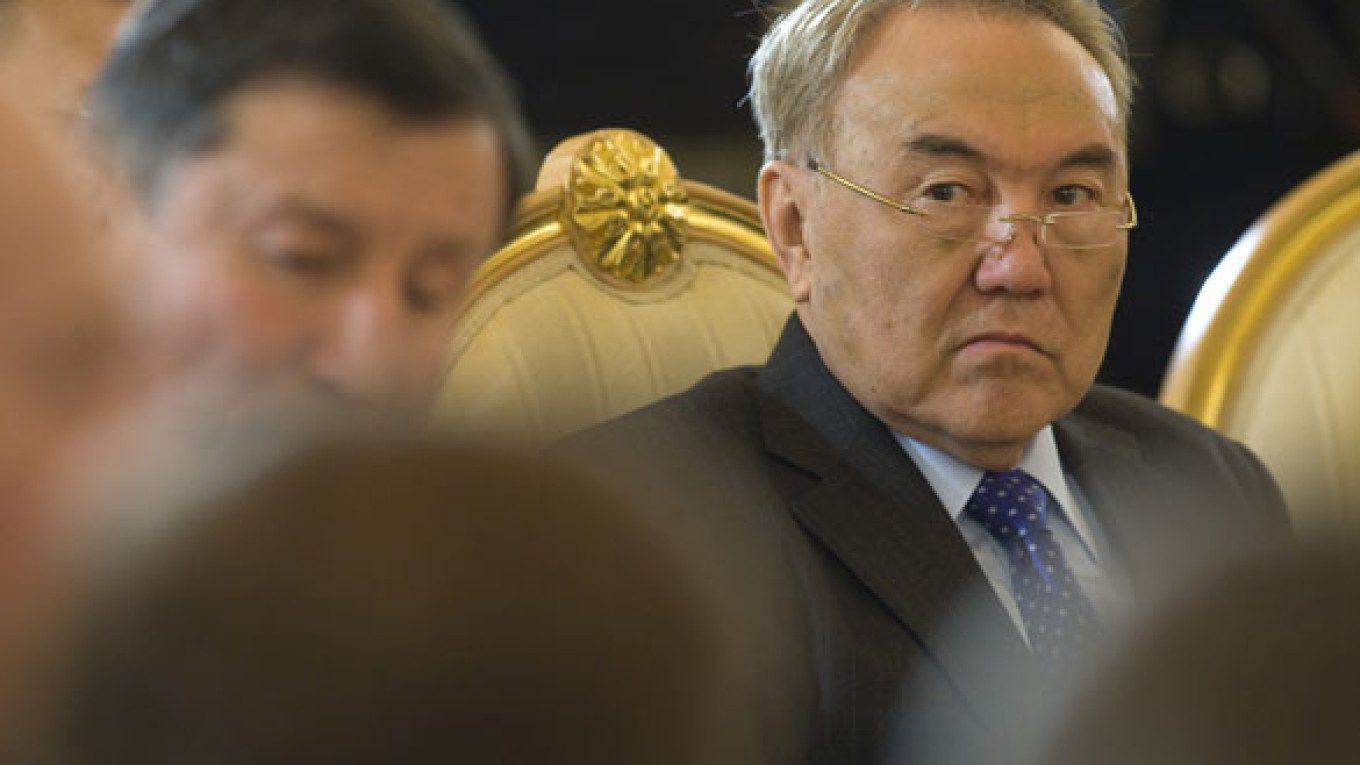ALMATY, Kazakhstan — Kazakhstan's parliament has proposed granting President Nursultan Nazarbayev special powers for life, a move that could pave the way for him to put in place a pliant successor.
Analysts say the absence of a clear successor to Nazarbayev, 69, is the biggest worry for investors, who have poured more than $100 billion into the resource-rich nation since it broke fr om the Soviet Union in 1991.
The law would give Nazarbayev immunity from prosecution and control over some government policy after he retires, providing him with an "insurance policy" should he give up the powerful presidency that he has built up during his 21 years in office.
On Wednesday, two lawmakers from Nazarbayev's Nur Otan party said the parliament, which has no opposition deputies, had started work on legislation pronouncing Nazarbayev "the leader of the nation" with special powers even after he leaves office.
"The bill contains a provision that key domestic and foreign policy initiatives must be agreed with the first president and the leader of the nation," deputy Amzebek Zholshybekov told the parliament in the capital, Astana.
Zholshybekov said the bill also gave Nazarbayev immunity from criminal prosecution for any actions taken while in office and protected all assets of the president and his family.
Both Nazarbayev's daughters own stakes in large local banks Halyk and Nurbank. He has no sons.
Nazarbayev's current term in office expires in 2012 but he can run for an indefinite number of terms according to a law introduced by his party in 2007.
The new bill is the first one providing Nazarbayev with some control over government policies after leaving the presidency and could provide a way to transfer power smoothly to a chosen successor.
"Seventy years is … the age when one can think about how to leave gracefully," Kazakh political analyst Dosym Satpayev said.
Western observers have never judged elections in Kazakhstan to be free and fair.
Rights groups have criticized the West for allowing Kazakhstan to take the rotating chair this year of Europe's main security and human rights watchdog, the Organization for Security and Cooperation in Europe.
Central Asian countries have yet to see a transition of power that does not involve a revolt or the death of a leader.
In neighboring Kyrgyzstan, a violent revolt toppled President Kurmanbek Bakiyev last month, five years after a similar uprising brought him to power.
The new Kyrgyz government made up of Bakiyev's opponents are seeking his extradition from Belarus, wh ere he has found refuge, to face criminal charges connected to 85 deaths during last month's revolt. It has also offered rewards for the detention of Bakiyev's family members.
Asked if the bill was a response to events in Kyrgyzstan, Kazakh Deputy Svetlana Ferkho said they were irrelevant.
"I think Nursultan Abishevich [Nazarbayev] is in the same league of great people as George Washington, Mustafa Ataturk, Mahatma Gandhi," she said.
A Message from The Moscow Times:
Dear readers,
We are facing unprecedented challenges. Russia's Prosecutor General's Office has designated The Moscow Times as an "undesirable" organization, criminalizing our work and putting our staff at risk of prosecution. This follows our earlier unjust labeling as a "foreign agent."
These actions are direct attempts to silence independent journalism in Russia. The authorities claim our work "discredits the decisions of the Russian leadership." We see things differently: we strive to provide accurate, unbiased reporting on Russia.
We, the journalists of The Moscow Times, refuse to be silenced. But to continue our work, we need your help.
Your support, no matter how small, makes a world of difference. If you can, please support us monthly starting from just $2. It's quick to set up, and every contribution makes a significant impact.
By supporting The Moscow Times, you're defending open, independent journalism in the face of repression. Thank you for standing with us.
Remind me later.


